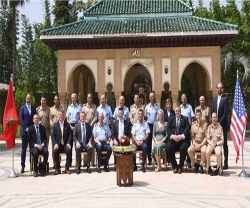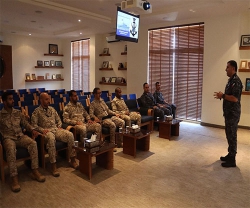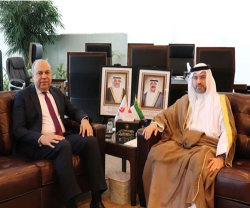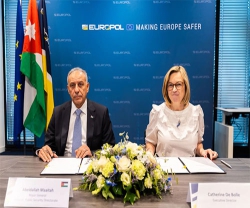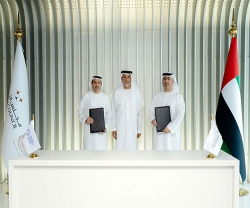BAE Briefs UAE Students on UAVs
29.11.2010 UAE
BAE Systems recently gave a presentation of its unmanned aerial vehicles (UAVs), the latest generation of pilot-less aircraft, to students at the Institute of Applied Technology (IAT) in Abu Dhabi and Dubai Men’s College.
Tom Hallett, a campaign co-coordinator for business development in BAE Systems’ autonomous systems and future capability business, addressed students on the future of UAVs and the balance between manned and uninhabited aerial vehicles using BAE Systems programmers such as Taranis, Mantis, and Herti as examples.
The presentation outlined autonomous solutions which allow for modern armed forces to undertake surveillance and reconnaissance operations in a wide range of operational scenarios, which may not always be safe.
They can also be used in a number of civilian situations such as maritime and coastal surveillance or for security and media coverage at major events, a statement said.
BAE Systems Herti, a highly adaptable, fully autonomous platform-based solution, was showcased as an example of a programmed that can provide robust, cost-effective surveillance and reconnaissance capability.
Hallett also examined the processes behind the development of Ova’s, highlighting how Mantis, an advanced technological demonstrator Medium Altitude Long Endurance (MALE) unmanned aircraft system, went from concept to first flight in 19 months due to BAE Systems rapid, advanced engineering processes.
Taranis, a prototype unmanned combat aircraft of the future which was unveiled in July 2010, will test the possibility of the first ever autonomous unmanned combat air vehicle that would be capable of precisely striking targets at long range even in another continent.
Demon, a novel UAV, which completed the first ever ‘flapless’ flight in the UK in September, showed first-hand how emerging technologies can change the face of aviation as we currently know it.
Martin Bennett, Regional Vice President - Middle East, BAE Systems, said: “BAE Systems occupies a leading position in the defense industry and is renowned for its engineering excellence and innovation. We work with universities in the UK and US to produce world-leading technology for a wide range of systems across the air, land and sea domains, of which our autonomous capability is just one key element.”
“We are delighted to be able to showcase some of this innovation in the UAE which we hope will encourage tomorrow’s generation of Emirati scientists and engineers to develop similar ground-breaking technologies for the future,” Bennett concluded.
Tom Hallett, a campaign co-coordinator for business development in BAE Systems’ autonomous systems and future capability business, addressed students on the future of UAVs and the balance between manned and uninhabited aerial vehicles using BAE Systems programmers such as Taranis, Mantis, and Herti as examples.
The presentation outlined autonomous solutions which allow for modern armed forces to undertake surveillance and reconnaissance operations in a wide range of operational scenarios, which may not always be safe.
They can also be used in a number of civilian situations such as maritime and coastal surveillance or for security and media coverage at major events, a statement said.
BAE Systems Herti, a highly adaptable, fully autonomous platform-based solution, was showcased as an example of a programmed that can provide robust, cost-effective surveillance and reconnaissance capability.
Hallett also examined the processes behind the development of Ova’s, highlighting how Mantis, an advanced technological demonstrator Medium Altitude Long Endurance (MALE) unmanned aircraft system, went from concept to first flight in 19 months due to BAE Systems rapid, advanced engineering processes.
Taranis, a prototype unmanned combat aircraft of the future which was unveiled in July 2010, will test the possibility of the first ever autonomous unmanned combat air vehicle that would be capable of precisely striking targets at long range even in another continent.
Demon, a novel UAV, which completed the first ever ‘flapless’ flight in the UK in September, showed first-hand how emerging technologies can change the face of aviation as we currently know it.
Martin Bennett, Regional Vice President - Middle East, BAE Systems, said: “BAE Systems occupies a leading position in the defense industry and is renowned for its engineering excellence and innovation. We work with universities in the UK and US to produce world-leading technology for a wide range of systems across the air, land and sea domains, of which our autonomous capability is just one key element.”
“We are delighted to be able to showcase some of this innovation in the UAE which we hope will encourage tomorrow’s generation of Emirati scientists and engineers to develop similar ground-breaking technologies for the future,” Bennett concluded.
Previous PostDubai: 4m Passengers in October
Latest news
Latest events
IDEF 2025 Turkey - International Defence Industry Fair
22 - 27 Jul 2025Istanbul Expo Center - TurkeyDSEI 2025
09 - 12 Sep 2025Excel, London - United KingdomIntersec Saudi Arabia
29 Sep - 01 Oct 2025Riyadh International Exhibition & Convention Centre - Saudi ArabiaDubai International Air Chiefs’ Conference (DIACC 2025)
16 Nov 2025Atlantis, The Palm Dubai - United Arab Emirates








